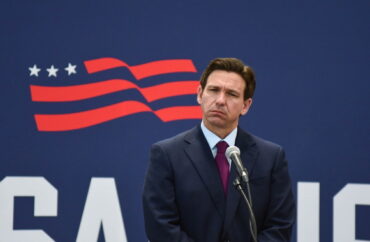
Three Florida professors have filed a lawsuit challenging the constitutionality of a 2023 state law subjecting public university faculty to mandatory post-tenure review every five years.
The scholars argue the law “imperils academic freedom” and enables the Florida legislature to “usurp the exclusive powers and duties” of the state university system’s Board of Governors granted to it by Florida’s constitution.
While two of the three plaintiffs are scholars who have left-leaning views, the third is a Christian professor who said the law could have unintended consequences.
Steven Willis, a professor at UF’s Levin College of Law, said he fears that weakening tenure protections might render conservative faculty members vulnerable to being punished for their political beliefs.
“I support Governor DeSantis,” Willis told The College Fix in an interview. “But I believe this law exceeded the legislature’s authority.”
“Without tenure, there is an enormous target on my back, as well as that of all conservative academics and all Christian academics.”
Willis said he recognizes the merits of post-tenure review, but the new law “lacks due process” and “applies unclear rules retroactively.”
“It places the power to evaluate us in administrators who have historically been hostile to Christians and Republicans,” said Willis, who added in the past he has been investigated for his beliefs.
SB 266 requires the board to implement post-tenure review at state universities assessing faculty members’ productivity and teaching performance.
The law also states decisions concerning “evaluations, promotions, tenure, discipline, or termination, may not be appealed beyond the level of a university president or designee,” and that disputes over such matters are not subject to arbitration.
These two provisions “reduce the substantive protections of tenure from a permanent position (subject to for-cause dismissal) to a five-year contract renewable at the discretion of university presidents,” the plaintiffs claim.
The complaint quotes Florida State University’s Office of the Provost as saying that, when it comes to removing tenured faculty, “each community of scholars forms its own definition of ‘adequate cause,’ specifically misconduct or incompetence. No single person can exercise that authority.”
Reforming tenure has been a priority of Republican Florida Gov. Ron DeSantis, who called unproductive tenured faculty the “number one financial drag” on state universities during a July speech at St. Petersburg College.
“There are some people that think you have a right to have some taxpayer institutions with no accountability. That they should just be able to do whatever they want,” DeSantis also said earlier this year at State College of Florida.
Former University of Florida President Ben Sasse and Provost J. Scott Angle have also supported using post-tenure review to address declining productivity among faculty who have “quietly retired.”
“We have lots of folks who are extraordinarily productive, we also have a significant number of folks who cease to be research productive overtime,” Sasse said at an August 2023 UF faculty senate meeting.
Angle advocates for review measures that prioritize remediation.
“The first step should never be ‘You’re done, time to move,’” Angle said in the same meeting.
As The College Fix reported earlier this month, 34 professors didn’t meet expectations and five were dubbed unsatisfactory under the post-tenure review process implemented at the University of Florida. The 39 scholars were among a total of 262 critiqued during the initial wave of reviews.
The plaintiffs also argue that faculty subject to at-will dismissal will be “reluctant to pursue new, bold and controversial ideas which may challenge the prevailing orthodoxy.”
Adriana Novoa, a professor of history at the University of South Florida, and Sarah Hernandez, a sociology professor at New College of Florida, are plaintiffs in the lawsuit.
Novoa’s biography on USF’s website states she is writing a book on masculinity and Darwinism in Argentina.
She writes that “the naturalist literature of the late nineteenth century introduced and used many of [sic] scientific analogies related to mating and sexuality,” and her work would “help us to understand the naturalization of racial and gender ideas in the texts of writers inspired by science.”
Novoa previously sued successfully in federal district court in 2022 to enjoin Florida’s “Stop WOKE Act,” which prohibits the teaching of essentialist and discriminatory theories on race and sex in public institutions of higher learning.
Hernandez teaches a course titled “Race and Ethnicity: An Interdisciplinary Exploration” and serves as codirector of the Initiative on Diversity and Equity in Academics at NCF.
In August 2023, Hernandez sued to overturn portions of SB 266 that ban the funding of Diversity, Equity, and Inclusion programs, as well as instruction in identity politics in general education courses. The court denied an injunction due to her lack of standing.
Hernandez was represented in both cases by NCF Freedom, a nonprofit formed in response to DeSantis’ appointment of conservative scholars to the New College of Florida’s board of trustees in early 2023.
NCF Freedom’s website states that it aims to “avoid unethical, improper or illegal actions by the State, the Board of Governors, the Board of Trustees, or the Administration that will harm the mission and future of New College.”
NCF Freedom did not respond to a request from The College Fix seeking comment.
NCF Freedom attorney Gary Edinger, who states that “my personal politics are decidedly progressive,” represented Novoa in her 2022 case against the “Stop WOKE Act.”
MORE: At FSU, zero professors flunked new post-tenure review. Here’s why.
Like The College Fix on Facebook / Follow us on Twitter






Please join the conversation about our stories on Facebook, Twitter, Instagram, Reddit, MeWe, Rumble, Gab, Minds and Gettr.